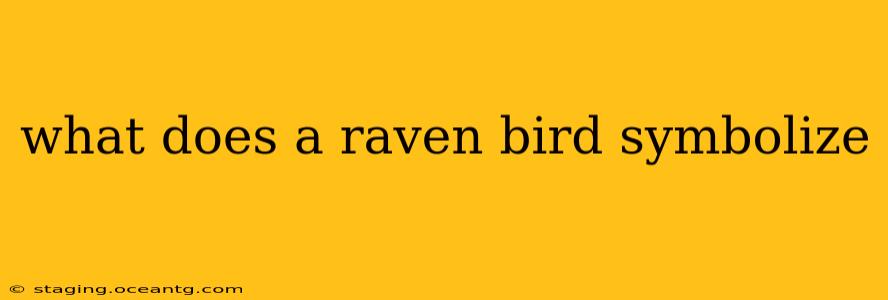Ravens, with their striking black plumage and intelligent eyes, have captivated human imagination for centuries. Their symbolism is rich and multifaceted, varying across cultures and contexts. While often associated with ill omens in some traditions, their symbolism is far more complex and nuanced than a simple "good" or "bad" dichotomy. Understanding the symbolism of ravens requires exploring their diverse interpretations throughout history and different cultures.
What are the common symbolic meanings of ravens?
The most common symbolic meanings associated with ravens include intelligence, mystery, magic, prophecy, change, transformation, and even death. However, it's crucial to consider the specific context in which the raven appears. A raven soaring over a battlefield might symbolize death and loss, while a raven perched on a tree might represent wisdom and insight.
What does a raven symbolize in different cultures?
Celtic Cultures: In Celtic mythology, ravens were often associated with prophecy and wisdom. They were seen as messengers of the gods, carrying secrets and insights from the otherworld. Their association with the divine made them powerful symbols of knowledge and spiritual connection.
Native American Cultures: Many Native American tribes viewed ravens as tricksters and shapeshifters. They were both revered and feared, representing both creativity and chaos. Their ability to adapt and thrive in diverse environments made them symbols of resilience and cunning. Some tribes also saw them as messengers of the gods, similar to Celtic interpretations.
Norse Mythology: In Norse mythology, ravens are associated with Odin, the chief god. Two ravens, Huginn ("thought") and Muninn ("memory"), served Odin, flying across the world and reporting back to him on events. This reinforces the raven's association with knowledge, wisdom, and foresight.
What does a raven symbolize in literature and art?
Ravens have frequently appeared in literature and art as symbols of mystery, darkness, and foreboding. Edgar Allan Poe's famous poem "The Raven" solidified the raven's association with melancholy and loss. However, other works portray ravens in a more positive light, emphasizing their intelligence and connection to the supernatural.
Do ravens symbolize death?
While ravens are often associated with death, this isn't always a negative connotation. In many cultures, ravens are seen as guides to the afterlife, helping souls transition to the next world. Their presence might signify the end of one phase and the beginning of another, representing transformation and renewal, rather than purely negative connotations.
Are ravens a symbol of bad luck?
The belief that ravens symbolize bad luck is largely a Western interpretation, often stemming from folklore and superstition. However, this view overlooks the richer, more complex symbolism found in other cultures, where ravens are venerated as wise and powerful creatures.
What does a raven symbolize spiritually?
Spiritually, a raven can symbolize intuition, psychic awareness, and a connection to the unseen world. Encountering a raven may be a sign to trust your instincts, embrace change, or seek deeper understanding of yourself and the world around you.
What is the difference between a raven and a crow?
While both are corvids (members of the crow family) and often confused, ravens are significantly larger than crows, have a heavier build, a wedge-shaped tail, and a deeper, more resonant call. Their symbolism, while often overlapping, can have subtle differences.
In conclusion, the symbolism of the raven is far richer and more multifaceted than a simple good or bad dichotomy. Its meaning is heavily influenced by cultural context, individual interpretation, and the specific situation in which the raven is encountered. Understanding this complexity offers a deeper appreciation for the enduring power of this captivating bird.
